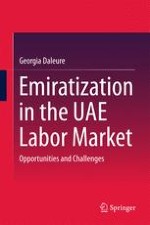2017 | OriginalPaper | Chapter
9. Education, the Work Force, and Emiratization
Author : Georgia Daleure
Published in: Emiratization in the UAE Labor Market
Publisher: Springer Singapore
Activate our intelligent search to find suitable subject content or patents.
Select sections of text to find matching patents with Artificial Intelligence. powered by
Select sections of text to find additional relevant content using AI-assisted search. powered by
